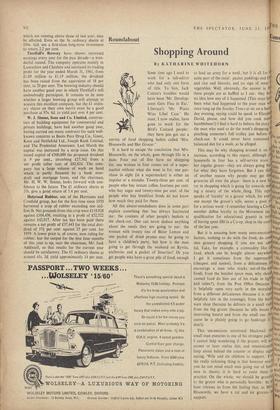Roundabout
Shopping Around
By KATHARINE WHITEHORN It is hard to escape the conclusion that Mrs. Housewife, on the whole, goes through life in a daze. Four out of five have no shopping list, one woman in four comes out of a super- market without what she went in for, one pur- chase in eight (in a supermarket) is either an impulse or a mistake. Twenty-three per cent. of people who buy instant coffee, fourteen per cent. who buy sugar and twenty-nine per cent. of the people who buy breakfast foods do not know how much they paid for them.
All this absent-mindedness does in some part explain something that has always fascinated me: the contents of other people's baskets at the check-out. One can never deduce anything about the meals they are going to eat: the woman with twenty tins of Bitter Lemon and one packet of dried prunes may be going to have a children's party, but how is the man going to get through the weekend on Ryvita, anchovies and a packet of Smarties? Or you get people who have a great pile of food, enough to feed an army for a week, but it is all for same part of the meal: packet puddings and fr and rice and biscuits, and no sign of meat vegetables. Well, obviously, the answer is th these people are as baffled as I am: they ha no idea how any of it happened. (This must ha') been what had happened to the poor man ‘fr once rang up the Sunday Times at six on a Sat day evening, saying could he speak to Elizabr David, please, and how did you cook tin bumblebees?) I find it hard to believe the stor the man who used to do the week's shopping pinching someone's full trolley just before t the nito balanced diet for a week, as he alleged. housewife in four has a self-service store check-out. It could never have contained increase, according to this report, although nits be; This may be why shopping around is on t Mi obitsle a idea a It v her regular grocer—they are always going I a. rules for what they have forgotten. But I can till Ilalial of another reason why people may get the often groceries all over the place: there is a new fa, permi for in shopping which is going far towards mat ing a misery of the whole, thing. This repo camp speaks of `loyalty' to a grocer which, for evert pebpi one except the grocer's wife, seems a poor for a serious word—I remember hearing a Co member define loyalty to the Movement (1 qualification for educational grants) in to of having spent £80 in a Co-op. shop in the co of the last year. Yt -0 Is rnf ur' But it is amazing how many semi-emotion; factors, nothing to do with the food, do con into grocery shopping if you are not car ful. Take, for example, a commodity like CO food, which can be bought almost anywt er I get it sometimes from the supermarke (cheapest and easiest), from a delicatessen encourage a man who stocks out-of-the-01 food), from the butcher (poor man, why should canned food do him out of his trade in light and tubes?), from the Post Office (because is helpfully open very early in the morning) from a different delicatessen (because it is (pet) helpfully late in the evenings), from the hard ware shop (because he delivers in a small van)' from the big grocer (because he sells booz interesting hours) and from the small one cause he is plainly going to go bankrupt Li a I don't). This unconscious emotional blackmail the small man exercises is one of his strongest pi I cannot help wondering if the grocers will not sooner or later realise this, and ostentatioo limp about behind the counter or display signs th°1 saying, 'Wife and six children to support.' for r°01 the really sickening thing is that however much r you do not mind small men going out of t ttal' °f 1 ness in theory, it is hard to resist them 'teal practice. On the whole, we should be grateful 4ssl- to the grocer who is personally horrible: he at rise least releases us from the feeling that, as Mrs ;31 Housewife, we have a cat and six grocers 10 'cgs support. Deg


































 Previous page
Previous page